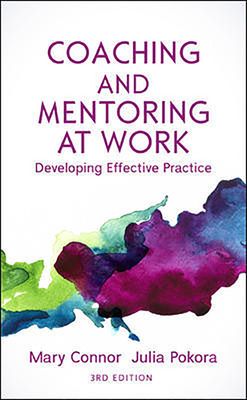Coaching and Mentoring at Work: Developing Effective Practice
Introduction
PART 1 EFFECTIVE COACHING AND MENTORING
1 What is effective coaching and mentoring at work?
2 How can I be an effective coach or mentor?
3 How can I be an effective client?
4 What are some ethical issues?
PART 2 APPROACHES TOOLS & TECHNIQUES
5 What are some approaches and models?
6 What is The Skilled Helper model?
7 How is The Skilled Helper used in practice?
8 What are some useful tools and techniques
PART 3 COACH AND MENTOR DEVELOPMENT
9 What is reflective practice, supervision and accreditation?
10 How can I be reflective in practice?
11 What are frequently asked questions?
12 Glimpses of coaches and mentors at work
Appendix: useful contacts and websites
Bibliography
Index
The third edition of this popular, practical and authoritative book has been revised and updated, with two new chapters. It is aimed at coaches, mentors and clients and features:
Nine key principles of effective coaching and mentoring, showing how to apply them
Discussion of differences between coaching and mentoring across different contexts and sectors
Ideas about how to be an effective coach or mentor and how to be an effective client
Self-development checklists and prompts, and a wealth of interactive case material
New chapter on useful approaches and models
The Skilled Helper model and how to apply it to coaching and mentoring
A range of tried and tested tools and techniques
Ethical issues, reflective practice and supervision
New chapter in which coaches and mentors share experiences from Business, Health, Education & the Public Sector
"So many people think that mentoring is simple – you just pass on what you know from the pinnacle of your wisdom and experience. In fact when well done it is the art that conceals art. Similarly there is an art in making what is not simple sound accessible and do-able, which is exactly what this book does. It breaks the news very gently and very clearly that successful mentoring and coaching is nothing like as easy as it looks, either to be a good mentor or to be a good mentee. Throughout the book the message is clear: being a coach or mentor is very different from the expert helper role familiar to most managers - a lot more difficult and a lot more effective and here is how to do it."
Jenny Rogers, Executive Coach and author of Coaching Skills: The Definitive Guide to Being a Coach, Fourth Edition (Open University Press, 2016), UK
"The third edition of Coaching & Mentoring at Work has been revised and updated. There are two new chapters: 'Coaching & Mentoring Approaches and Models', and 'Glimpses of Coaches and Mentors at Work'. Readers of the previous editions have valued the focus on effective and ethical practice as well as the clear links between principles, approaches, skills, tools, techniques and interactive case examples. This latest edition continues to be an excellent resource for coaching and mentoring purchasers, providers and students."
Gerard Egan, Professor Emeritus, Loyola University, Chicago, USA
"It is great to see this new updated edition of Mary Connor and Julia Pokora’s book, which shows how much is developing and changing in this fast moving field."
Peter Hawkins, Professor of Leadership, Henley Business School, Chairman of Renewal Associates, author of many books including Creating a Coaching Culture (Open University Press, 2012) and Leadership Team Coaching (2014), UK
"This new edition from Connor and Pokora has some new and interesting additions. In the ten years since the first edition, much has happened in the coaching and mentoring world. The highlighting of ethical issues in Part 1 of the book recognises that the coaching and mentoring worlds have become much more aware of ethical concerns. The addition of insights into the variety of models for coaching and mentoring and the practical nature of Part 2 of the book is welcome and the shift of focus in Part 3 to Coach and Mentor Development reflects contemporary debate. Written in a practical and accessible style, this book is a must for those working with coaching and mentoring."
Professor Bob Garvey, Managing Partner, The Lio Partnership, UK
"When this book was first published in 2007 it immediately became an invaluable reference and source of guidance for the part of my work involved with the development mentoring of engineers and engineering project management professionals. The restructured content and additional material provided by the third edition

